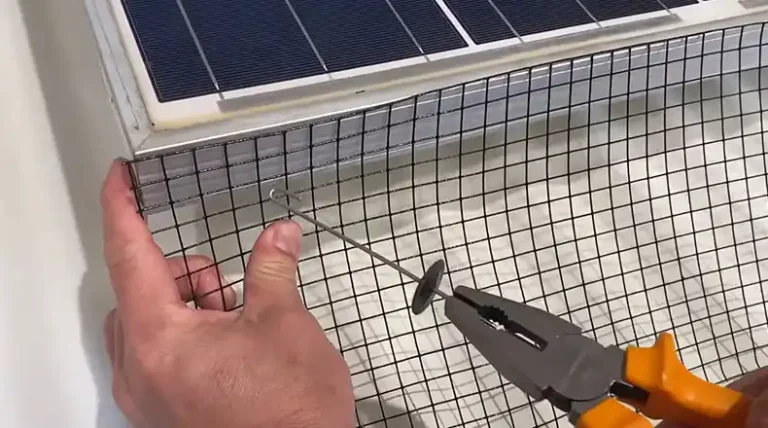LG vs Panasonic Solar Panels | Which One Is Better?
As the world becomes increasingly aware of the need for sustainable energy solutions, solar panels have emerged as a popular and environmentally friendly option. In this article, we’ll take a closer look at two prominent manufacturers in the solar panel industry: LG and Panasonic. Our goal is to help you make an informed decision by comparing these brands across various factors like efficiency, warranty, degradation rate, etc.
Solar panels are a long-term investment, and it’s important to choose the right ones for your needs. In that case, this comprehensive comparison will guide you through the key differences between LG and Panasonic solar panels.
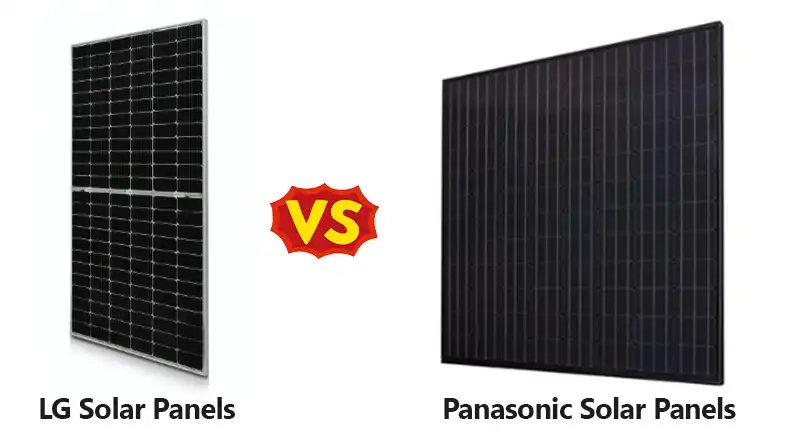
Brand Reputation: LG vs. Panasonic
LG and Panasonic are two titans in the consumer electronics industry, with a rich history of innovation and technological advancements.
LG was founded in 1958 in South Korea. Over the decades, the company has diversified into various sectors, including renewable energy solutions. LG’s solar panel division was established in the late 1990s, making it one of the pioneers in the residential and commercial solar market.
Panasonic traces its roots back to 1918 in Japan. Its foray into solar energy began in the 1970s, and it has since become a leading manufacturer of high-efficiency solar panels for residential, commercial, and utility-scale projects.
LG vs. Panasonic Solar Panel Efficiency
Panel efficiency plays an important role when evaluating solar panels, as it determines how much energy a panel can produce per unit area. Here’s a comparison of the average and range of efficiency for LG and Panasonic solar panels –
| Brand | Average Efficiency | Efficiency Range |
| LG | 20.75% | 19.5% – 22.0% |
| Panasonic | 21.55% | 20.8% – 22.3% |
As the table illustrates, Panasonic solar panels generally have a higher average efficiency compared to LG panels. This makes them an attractive option for installations with limited space or higher energy demands.
LG vs. Panasonic Solar Panel Warranty
Solar panels are a long-term investment, and a comprehensive warranty is essential to protect your investment and provide peace of mind. Both LG and Panasonic offer industry-leading warranties on their solar panels.
| Brand | Warranty Length | Additional Performance Warranty (Output) |
| LG | 25 years | 90.8% |
| Panasonic | 25 years | 92% |
As the table shows, both LG and Panasonic offer a standard 25-year product warranty. But Panasonic’s performance warranty is slightly better, promising 92% of the initial output after 25 years, compared to 90.8% for LG.
Degradation Rate of LG and Panasonic Solar Panel
The degradation rate of solar panels refers to the gradual decline in their energy production over time due to various factors, such as exposure to sunlight, temperature fluctuations, and environmental conditions.
Panasonic solar panels boast an industry-leading low annual degradation rate of around 0.26% per year. In comparison, LG solar panels have a slightly higher annual degradation rate of approximately 0.40% per year.
This means that Panasonic panels may retain a higher percentage of their initial output after several years of use, potentially resulting in greater energy savings over the long run.
Price of LG and Panasonic Solar Panel
When it comes to pricing, Panasonic solar panels typically carry a slight premium compared to LG panels.
Panasonic solar panels typically cost between $2.61 and $3.45 per watt, before incentives and rebates. LG solar panels, on the other hand, are generally priced slightly lower, ranging from $0.80 to $1.00 per watt.
For example, if you were to install a 6 kW solar system –
- With Panasonic panels, the estimated cost would be around $15,660 to $20,700.
- With LG panels, the estimated cost would be between $4,800 and $6,000.
Pros and Cons of LG and Panasonic Solar Panel
When choosing between LG and Panasonic solar panels, it’s important to weigh the pros and cons of each brand and consider your specific needs and priorities.
LG
LG solar panels offer the following advantages –
- Competitive pricing, making them a cost-effective option
- Excellent aesthetics, with a sleek and modern design
- Strong brand reputation and long-standing presence in the solar industry
However, LG panels also have some potential drawbacks –
- Slightly lower efficiency compared to Panasonic panels
- Higher degradation rate, potentially leading to lower energy production over time
Panasonic
Panasonic solar panels, on the other hand, boast the following advantages –
- Industry-leading efficiency ratings, maximizing energy production
- Exceptionally low degradation rates, ensuring consistent performance
- Robust warranty coverage, providing long-term peace of mind
Potential drawbacks of Panasonic panels include –
- Higher upfront costs compared to LG panels
- Limited availability in some regions due to high demand
Ultimately, the choice between LG and Panasonic solar panels will depend on your specific priorities, budget, and long-term goals for your solar installation.
Special Consideration While Choosing Between LG and Panasonic Solar Panel
LG exited the solar panel business in early 2023, focusing on other areas. Although they will honor warranties, future availability of replacement parts and new LG panels is uncertain. If you choose LG panels, consider potential challenges like finding compatible replacements in the future, as mixing panels from different manufacturers might cause compatibility issues and reduce system performance.
Conclusion: Who’s the winner?
When it comes to choosing between LG and Panasonic solar panels, there is no clear winner. The best choice ultimately depends on your individual priorities and specific needs. If you prioritize the highest efficiency and long-term performance, Panasonic solar panels may be the ideal option. However, if you’re looking for a more cost-effective solution while still enjoying excellent aesthetics (availability permitting), LG panels could be a great choice.
People Also Ask
Can I mix and match LG and Panasonic solar panels in the same system?
While it is technically possible to install both LG and Panasonic solar panels in the same system, it is generally not recommended. Mixing different panel types and models can lead to potential compatibility issues, inconsistent performance, and potential warranty complications. For optimal system performance and seamless integration, it’s best to stick with panels from a single manufacturer.
How do LG and Panasonic solar panels perform in extreme weather conditions?
Both LG and Panasonic solar panels are designed to withstand harsh weather conditions such as high winds, heavy snowfall, and extreme temperatures. These panels undergo rigorous testing to ensure they can withstand various environmental stresses. However, it’s important to follow the manufacturer’s guidelines for proper installation and maintenance to maximize their durability and performance in challenging weather conditions.
Are LG and Panasonic solar panels compatible with different inverter brands?
Yes, both LG and Panasonic solar panels are generally compatible with various inverter brands available on the market. However, it’s crucial to consult with your solar installer to ensure that the specific panel and inverter models you choose are compatible and optimized for your system configuration. Proper compatibility between the panels and inverter is essential for efficient energy production and system performance.

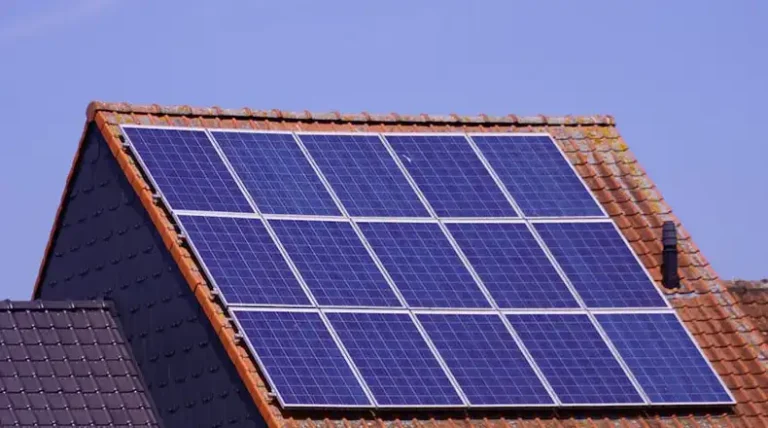
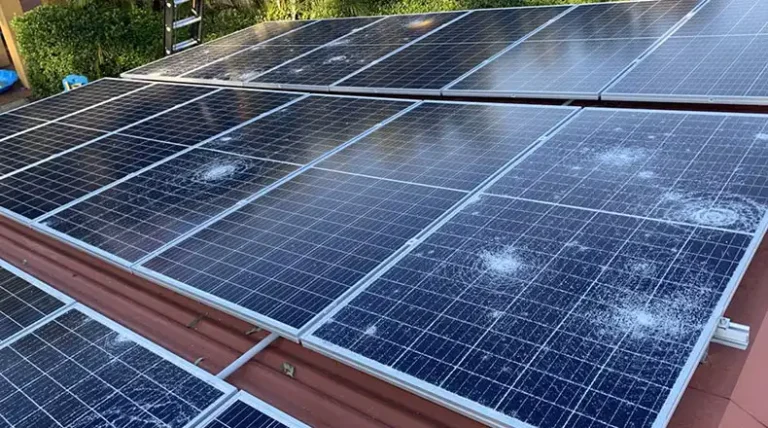
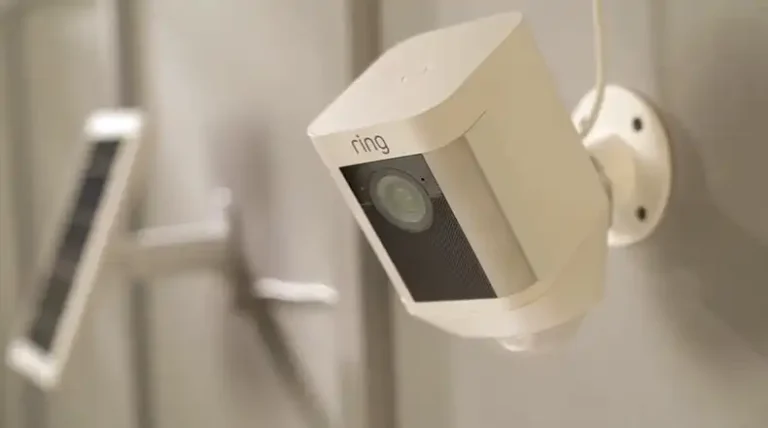
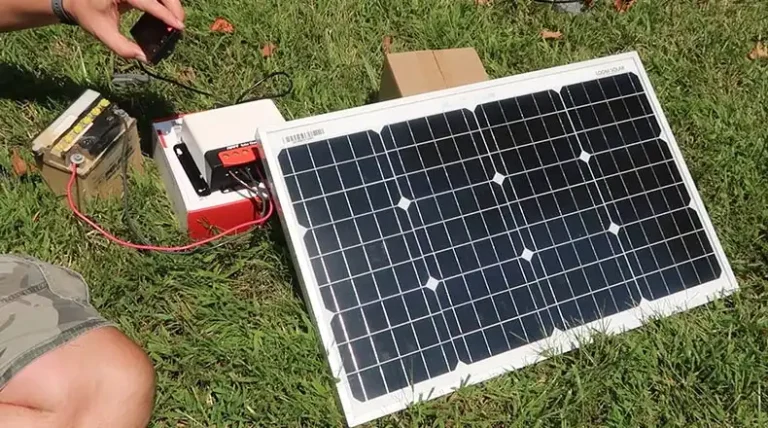
![Can You Put Solar Panels on a Townhouse? [Answerd]](https://www.itekenergy.com/wp-content/uploads/2024/04/Can-You-Put-Solar-Panels-on-a-Townhouse-768x428.jpg)
